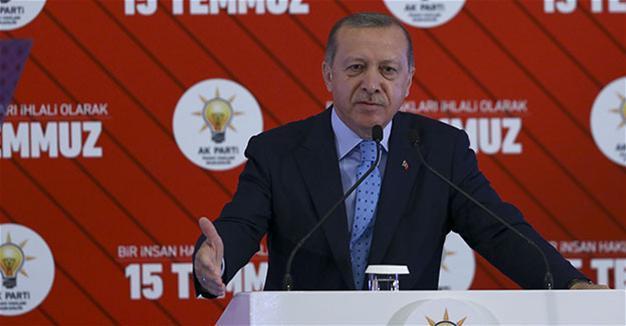Thwarting coup marks turning point in history of democracy: Turkish President Erdoğan
ISTANBUL

President Recep Tayyip Erdoğan speaks during a meeting - AA photo
President Recep Tayyip Erdoğan has said that thwarting the July 15, 2016, failed coup attempt marked “a turning point in the history of democracy.”In an opinion piece titled “Turkey, a year after the attempted coup, is defending democratic values” published in the Guardian on July 15, Erdoğan said that the fact that the coup bid was prevented “will be a source of hope and inspiration for all peoples who live under dictators.”
“Exactly one year ago, millions of Turkish citizens set aside their political, cultural and ethnic differences to form a united front against the plotters who tried to suspend our country’s constitution, shot at innocent civilians and bombed the parliament. Together, the people of Turkey refused to allow an armed group to rob them of democracy, liberty and their way of life,” Erdoğan said in the piece penned to mark the one year anniversary of the coup attempt, widely believed to have been masterminded by the followers of the U.S.-based Islamic preacher Fethullah Gülen.
“My government’s continuing efforts to bring to justice Fethullah Gülen and his followers – who, evidence suggests, were behind the failed coup – isn’t just important for Turkey but for democracy everywhere,” he also said.
On July 15, 2016, coup plotters blocked roads and bombed state institutions, including the parliament, before the attempted takeover was thwarted with the help of citizens resisting putschist soldiers on the streets. A total of 250 people were killed and 2,193 others were wounded on the night of the attempted coup.
Saying that the ruling Justice and Development Party (AKP) “implemented reforms to empower elected officials at the expense of certain groups within the military” since its rise to power in 2002, Erdoğan noted that “by doing so we have been able to restore the Turkish people’s confidence in public institutions.”
“Those who turned their weapons against innocent civilians on July 15 hit a brick wall made of a decade of progress in politics, economics, healthcare, justice, foreign policy and fundamental rights. This connection between the people and their government is the ultimate measure of our democracy’s resilience, and the strongest guarantee of its survival,” he added.
In the article, Erdoğan criticized Turkey’s allies for not expressing solidarity with the country after the attempted takeover, adding that their “hypocrisy and double standards” disturbed Turkish people.
“Unfortunately Turkey’s allies, particularly our friends in the west, have been unable to fully appreciate the significance of what happened. Instead of expressing solidarity with my countrymen, a number of western governments and institutions opted to wait and see how the crisis would play out,” he said.
Erdoğan also said that the fact that Turkey’s efforts to dismiss public officials over their suspected links to the Gülenists was met with criticism from the west “raised questions regarding the west’s commitment to my country’s democracy and security.”
“To add insult to injury, dozens of senior Gülenist leaders have been granted asylum by our country’s self-proclaimed friends and allies. There is no way to sugar-coat this betrayal of Turkey’s friendship – which is incompatible with bilateral relations and fundamental values alike. Today, western leaders have a choice between standing in solidarity with terrorists or regaining the favor of the Turkish people,” he added.
















